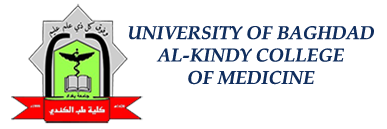Al-Kindy College of Medicine at the University of Baghdad hosted a symposium entitled “Climate Change and Its Effects on Health and Women.” Organized by the Continuing Education Unit in collaboration with the Women’s Affairs Unit, the event convened faculty, administrative staff, and students to assess the current and anticipated health impacts of environmental change, with particular emphasis on female populations.
Dean Professor Dr. Mohammed Shihab Al-Aidani inaugurated the proceedings, underscoring that climate change is not a distant concern but a present force shaping Iraqi health outcomes. Professor Dr. Mohammed Asaad (Public Health) then delivered the keynote address, citing data from recent heatwaves that saw a 30 percent increase in hospital admissions for heatstroke, dehydration, and renal complications. He further detailed how elevated particulate matter exacerbates asthma and chronic obstructive pulmonary disease (COPD), while altered precipitation patterns have extended mosquito breeding seasons, leading to higher incidences of malaria and dengue fever. Dr. Asaad urged that healthcare professionals advocate preventive measures—such as public cooling centers, early warning systems, and community education—to mitigate these trends before they overwhelm clinical resources.
Following a brief interlude, Professor Dr. Taghreed Al-Haidari (Women’s Health) examined the gender-specific dimensions of climate stressors. In rural districts along the Tigris, pregnant women facing extreme temperatures (often exceeding 45 °C) and limited access to cooling face increased risks of preterm birth, low birth weight, and obstetric complications. Humid conditions have contributed to surges in bacterial and fungal gynecological infections. Concurrently, food-price inflation resulting from poor harvests disproportionately affects women—who are customarily responsible for household provisioning—leading to anemia and micronutrient deficiencies. Dr. Al-Haidari also observed that resource scarcity and displacement have amplified gender-based violence, while the psychosocial burden of caregiving amid economic and environmental instability has elevated rates of anxiety and depression among women.
An interactive panel chaired by Professor Dr. Dhikra Najm followed, during which participants proposed actionable interventions. Suggestions included installing affordable air‐quality monitors in dust‐prone neighborhoods, establishing “Green Clinics” powered by solar panels to ensure uninterrupted care during power outages, and incorporating routine mental‐health screenings during summer months when environmental anxiety peaks. Panelists concurred on the necessity of integrating climate‐health education into the medical curriculum. In response, organizers announced plans for quarterly workshops on renewable energy use in healthcare facilities and sustainable medical‐waste management. Additionally, the College committed to offering seed grants for student research on climate‐adaptive public health solutions—such as drought‐tolerant community gardens and mobile applications linking vulnerable families to local cooling centers.
In closing, the Assistant Dean for Scientific Affairs reaffirmed Al-Kindy College’s role as a community partner. She outlined forthcoming collaborations with NGOs, local health authorities, and international agencies to secure funding for pilot initiatives aimed at reducing climate-related health risks. By late 2025, the College intends to inaugurate a fully integrated “Climate and Health” curriculum featuring field practicums and simulation laboratories. These will train medical students in diagnosing and managing heat‐related illnesses, air‐pollution emergencies, and vector‐borne disease outbreaks. Through these efforts, Al-Kindy College of Medicine aims to equip the next generation of Iraqi physicians with the knowledge and skills necessary to protect public well-being amid accelerating environmental change.




















